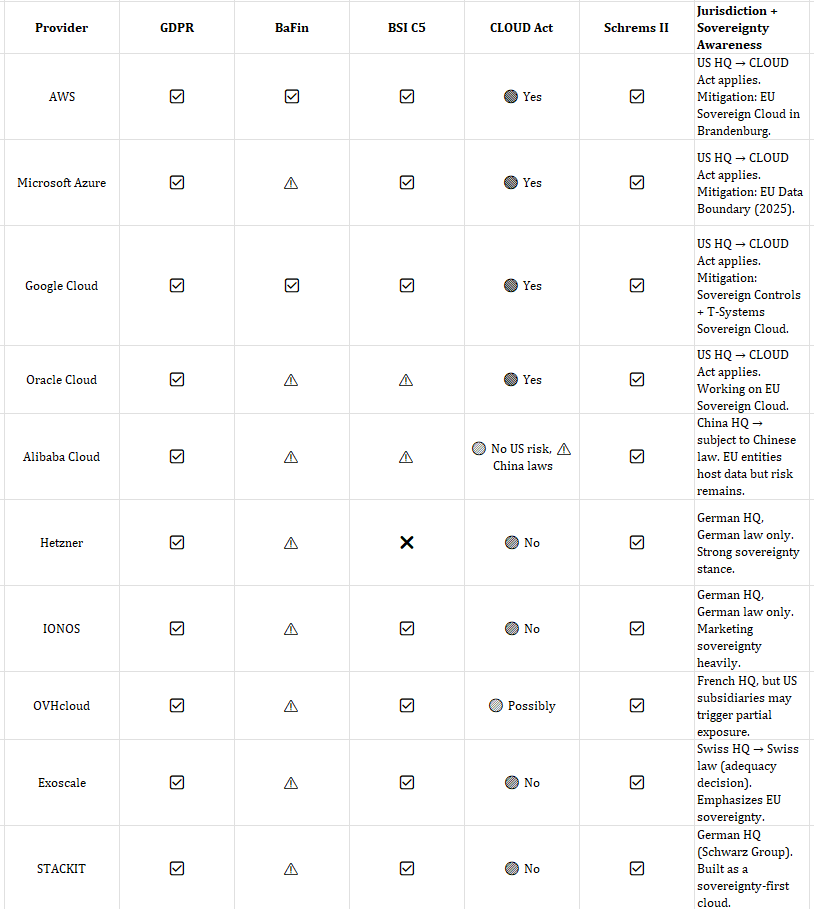The Cloud Compliance Maze in Germany: Who Really Controls Your Data?
COMPLIANCE AND GOVERNANCECLOUD SECURITY


Executive Summary
Choosing a cloud provider in Germany is no longer just about performance and cost. It’s about compliance, data sovereignty, and jurisdiction. US hyperscalers like AWS, Microsoft, and Google still fall under the CLOUD Act, even with German data centers, while European providers like Hetzner, IONOS, and STACKIT offer stronger sovereignty guarantees. This post helps you navigate GDPR, BaFin, BSI C5, Schrems II, and jurisdiction risks so you can make informed cloud decisions.
Why Compliance and Sovereignty Matter
When businesses in Germany move workloads to the cloud, the decision is no longer just about cost or scalability. Regulators, customers, and even courts demand answers to tougher questions: Where is my data stored? Who has access? Which laws apply if a foreign government comes knocking?
For highly regulated industries like finance (BaFin oversight), healthcare, and public sector, cloud providers must do more than just promise uptime. They need to prove compliance with GDPR, BaFin outsourcing rules, BSI C5, and Schrems II. And let’s not forget the elephant in the room: the U.S. CLOUD Act, which can give American authorities access to data stored outside the U.S. if the provider is headquartered there. This is where jurisdiction & sovereignty awareness becomes critical.
The Top Cloud Providers in Germany — With a Compliance Lens


Decoding the Sovereignty Spectrum
High exposure (🔴): US hyperscalers (AWS, Azure, Google, Oracle) — even with German/EU data centers, they are subject to the U.S. CLOUD Act. New sovereign/EU-only offerings are being rolled out.
Medium exposure (🟠): Alibaba (Chinese law jurisdiction), OVHcloud (EU HQ but with US ties).
Low exposure (🟢): German and Swiss providers (Hetzner, IONOS, Exoscale, and STACKIT). Governed by EU/German/Swiss law only, with sovereignty as a selling point.
Who Needs to Pay Attention?
Banks & Insurers: BaFin outsourcing rules demand auditability and legal clarity.
Healthcare & Pharma: Patient data requires strict GDPR and Schrems II compliance.
Public Sector: Digital sovereignty is a legal and political requirement.
Tech Scaleups: Cloud provider choice influences enterprise and public sector trust.
Final Thoughts
Moving to the cloud in Germany isn’t just a technical project — it’s a compliance and sovereignty strategy. It is important to keep track of changing EU privacy laws such as GDPR and DORA. While AWS, Azure, and Google bring cutting-edge tech, they also bring foreign jurisdiction risks. German and European providers like Hetzner, IONOS, and STACKIT offer peace of mind with sovereignty-first guarantees.
The key is not where your server sits but whose laws your provider answers to.